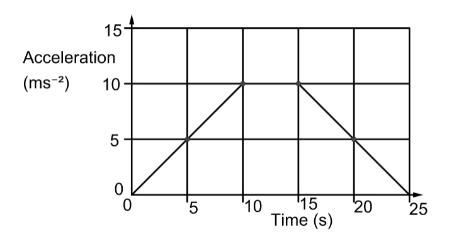Question
Question: The given plot shows the variation of acceleration (\(m{s^{ - 2}}\)) with time (\(s\)) for an object...
The given plot shows the variation of acceleration (ms−2) with time (s) for an object that started from rest at time t = 0 s. The velocity at time t = 15 s (v15) and 25 s (v25) are

A. v15 = 50 ms−1 and v25 = 0 ms−1
B. v15 = 100 ms−1 and v25= 150 ms−1
C. v15 = 50 ms−1 and v25 = 25 ms−1
D. v15 = 100 ms−1 and v25 = 25 ms−1
E. None of these
Solution
We will use our basic concepts of motion graphs and then use the concepts for solving the given question. We can use the concept of distance or displacement being the area under the curve of a velocity-time graph. Finally, we will put the values in suitable formulae and then select the correct answer.
Formulae Used:
Area of triangle= 21 × base × (height)2
And
Area of rectangle=length×breadth
Complete step by step answer:
We are given here with the acceleration time graph and we know that the area under the acceleration time graph gives us the velocity. Now, for the first time stamp of t = 15 s, we will evaluate the velocity v15. Now, area up to the timestamp of 15 s can be broken down in two parts area of the triangle from timestamp of 0 s to 10 s where base is 10 − 0 = 10 units, height is 10 − 0 = 10 units.
Thus, the area is ar (10 s) = 21 × 10 × 10 = 50.
And then the area of the rectangle from timestamp of 10 s to 15 s where the length is 10 − 0 = 10 units, breadth is 15 − 10 = 5 units.
Thus, area is ar (10 to 15) = 10 × 5 =50.
Thus, the velocity of timestamp of t = 15 s is v15 = ar (10 s) + ar (10 to 15) = 50 + 50 = 100 ms−1.
Now, for the timestamp of t = 25 s, we will evaluate the velocity v25.Now, area up to the timestamp of 25 s can be broken down in three parts area of the triangle from timestamp of 0 s to 10 s where base is 10 − 0 = 10 units, height is 10 − 0 = 10 units.
Thus, the area is ar (10 s) = 21 × 10 × 10 = 50.
And then the area of the rectangle from timestamp of 10 s to 15 s where the length is 10 − 0 = 10 units, breadth is 15 − 10 = 5 units.
Thus, area is ar (10 to 15) = 10 × 5 =50.
And, finally the area of the triangle from the timestamp of 15 s to 25 s with base 25 − 15 = 10 units and height of 10 − 0 = 10 units.
Thus, the area of the triangle is
ar (15 to 25) = 21 × 10 × 10 = 50
Thus, the velocity of timestamp of t = 25 s is v25 = ar (10 s) + ar (10 to 15) + ar (15 to 25) = 50 + 50 + 50 = 150 ms−1
Hence, the correct answer is B.
Note: Students often make mistakes while breaking the area into proper parts.Students should very carefully understand what is asked to find and then proceed to save time in channelizing in an incorrect direction. Students break down into parts where they fall into a situation of clumsy calculations.
